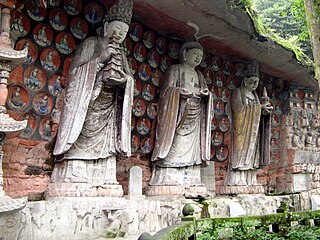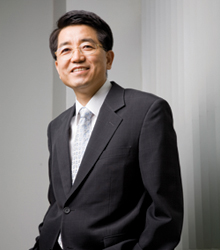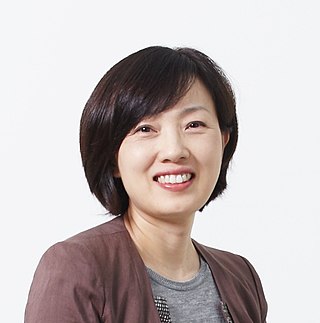
Vajrayāna, also known as Mantrayāna, Mantranāya, Guhyamantrayāna, Tantrayāna, Tantric Buddhism, and Esoteric Buddhism, is a Buddhist tradition of tantric practice that developed in the Indian subcontinent and spread to Tibet, Nepal, other Himalayan states, East Asia, and Mongolia.

Goryeo was a Korean state founded in 918, during a time of national division called the Later Three Kingdoms period, that unified and ruled the Korean Peninsula until 1392. Goryeo achieved what has been called a "true national unification" by Korean historians as it not only unified the Later Three Kingdoms but also incorporated much of the ruling class of the northern kingdom of Balhae, who had origins in Goguryeo of the earlier Three Kingdoms of Korea. The name "Korea" is derived from the name of Goryeo, also romanized as Koryŏ, which was first used in the early 5th century by Goguryeo. According to Korean historians, it was during the Goryeo period that the individual identities of Goguryeo, Baekje and Silla were successfully merged into a single entity that became the basis of the modern-day Korean identity. Goryeo was the successor state to Later Goguryeo and Goguryeo.

Seoul National University is a public research university located in Seoul, South Korea. It is one of the SKY universities and a part of the Flagship Korean National Universities.
The purpose of this timeline is to give a detailed account of Buddhism from the birth of Gautama Buddha to the present.

The Huayan school of Buddhism is a Mahayana Buddhist tradition that developed in China during the Tang dynasty (618-907). The Huayan worldview is based primarily on the Buddhāvataṃsaka Sūtra as well as on the works of Huayan patriarchs, like Zhiyan (602–668), Fazang (643–712), Chengguan (738–839), Zongmi (780–841) and Li Tongxuan (635–730).

Korean Buddhism is distinguished from other forms of Buddhism by its attempt to resolve what its early practitioners saw as inconsistencies within the Mahayana Buddhist traditions that they received from foreign countries. To address this, they developed a new holistic approach to Buddhism that became a distinct form, an approach characteristic of virtually all major Korean thinkers. The resulting variation is called Tongbulgyo, a form that sought to harmonize previously arising disputes among scholars.
The history of Buddhism can be traced back to the 5th century BCE. Buddhism arose in Ancient India, in the modern day Lumbini, and is based on the teachings of the renunciate Siddhārtha Gautama. The religion evolved as it spread from the northeastern region of the Indian subcontinent throughout Central, East, and Southeast Asia. At one time or another, it influenced most of Asia.
Christopher I. Beckwith is an American philologist and distinguished professor in the Department of Central Eurasian Studies at Indiana University Bloomington, Indiana.

Jogyesa is the chief temple of the Jogye Order of Korean Buddhism. The building dates back to the late 14th century and became the order's chief temple in 1936. It thus plays a leading role in the current state of Seon Buddhism in South Korea. The temple was first established in 1395, at the dawn of the Joseon Dynasty; the modern temple was founded in 1910 and initially called "Gakhwangsa". The name was changed to "Taegosa" during the period of Japanese rule, and then to the present name in 1954.
James B. Palais was an American historian, Koreanist, and writer. He served as Professor of Korean History at the University of Washington; and he was a key figure in establishing Korean studies in the United States.
Kim Won-yong (1922–1993) was a South Korean archaeologist and art historian. Noted in the discipline of Korean archaeology and ancient art history, he was one of the first people recognized as an archaeologist in Korea to receive a Doctor of Philosophy degree.
Koryo-mar is a dialect of Korean spoken by Koryo-saram, ethnic Koreans who live in the countries of the former Soviet Union. It is descended from the Hamgyŏng dialect and multiple other varieties of Northeastern Korean. Koryo-mar is often reported as difficult to understand by speakers of standard Korean; this may be compounded by the fact that the majority of Koryo-saram today use Russian and not Korean as their first language.
Kim Ho-dong is a Korean historian, professor at Seoul National University. His research interests include nomadic societies of Central Asia and their interaction with the Chinese state.
Wang Ryung, also known as Wang Yung, was a Korean hojok, or local regional lord of Song-ak, who lived during the Later Three Kingdoms period. He was the father of Wang Kon, the founder of the Goryeo dynasty. He was later posthumously honoured with a temple name of Sejo and a posthumous name of King Wimu the Great by his descendants.
The James B. Palais Book Prize has been awarded annually since 2010 by the Association for Asian Studies (AAS). Pioneer Korean studies scholar James Palais is commemorated in the name of this prize.

Taeghwan Hyeon is a South Korean chemist. He is SNU distinguished professor in the School of Chemical and Biological Engineering at Seoul National University, director of Center for Nanoparticle Research of Institute for Basic Science (IBS), and an associate editor of the Journal of the American Chemical Society.

V. Narry Kim is a South Korean biochemist and microbiologist, best known for her work on microRNA biogenesis. Her pioneering studies have laid the groundwork for the biology of microRNA and contributed to the improvement of RNA interference technologies.

Kim Seong-Kon, also known as Seong-Kon Kim, is a South Korean academic, literary critic, film critic, columnist, editor and writer.
Robert Evans Buswell Jr. is an American academic, author and scholar of Korean Buddhism and Chinese Buddhism as well as Korean religions in general. He is Distinguished Professor of Buddhist Studies at the University of California, Los Angeles and founding director of the Academy of Buddhist Studies at Dongguk University, Korea's main Buddhist university.
The Cambridge History of Korea is a forthcoming series of books to be published by Cambridge University Press surveying the history of Korea in four separate volumes from prehistory to the twenty-first century. According to series editor Donald L. Baker, the set will aim to be broad, accurate, and up to date, providing both a thorough survey of Korean history as well as comparative perspective of Korea's relationship with its neighbors.








